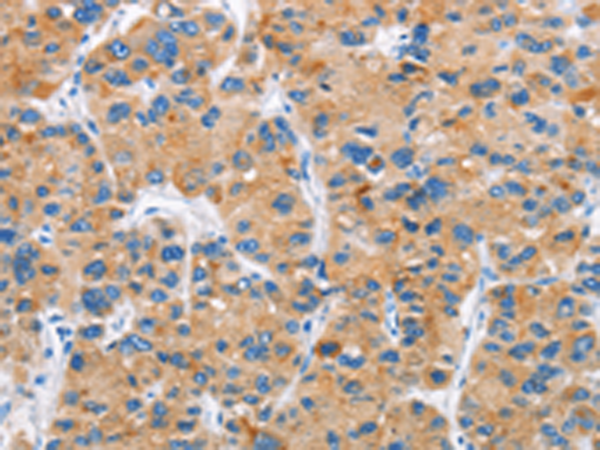
| WB | 咨询技术 | Human,Mouse,Rat |
| IF | 咨询技术 | Human,Mouse,Rat |
| IHC | 1/50-1/200 | Human,Mouse,Rat |
| ICC | 技术咨询 | Human,Mouse,Rat |
| FCM | 咨询技术 | Human,Mouse,Rat |
| Elisa | 1/2000-1/5000 | Human,Mouse,Rat |
| Aliases | DKK-2 |
| Host/Isotype | Rabbit IgG |
| Antibody Type | Primary antibody |
| Storage | Store at 4°C short term. Aliquot and store at -20°C long term. Avoid freeze/thaw cycles. |
| Species Reactivity | Human, Mouse |
| Immunogen | Fusion protein of human DKK2 |
| Formulation | Purified antibody in PBS with 0.05% sodium azide and 50% glycerol. |
+ +
以下是3-4篇关于DKK2抗体的代表性文献及其摘要概括(基于公开研究,非实时数据库检索):
1. **文献名称**:*DKK2 regulates tumor progression and immune metabolism in ovarian cancer via the β-catenin/STT3 pathway*
**作者**:Li, X. et al.
**摘要**:研究报道了抗DKK2单克隆抗体通过抑制Wnt/β-catenin信号通路,阻断卵巢癌细胞中STT3介导的糖代谢重编程,从而抑制肿瘤生长和转移,提示DKK2抗体在癌症治疗中的潜力。
2. **文献名称**:*Targeting DKK2 overcomes osteoimmunity-mediated resistance to bone regeneration*
**作者**:Chen, S. et al.
**摘要**:该研究开发了一种中和性DKK2抗体,通过拮抗DKK2对Wnt信号通路的抑制作用,促进成骨细胞分化和骨再生,同时调节免疫微环境,为骨质疏松和骨折修复提供新策略。
3. **文献名称**:*Anti-DKK2 therapy synergizes with checkpoint inhibitors in colorectal cancer by enhancing antitumor immunity*
**作者**:Wang, Y. et al.
**摘要**:研究发现DKK2在结直肠癌中高表达并与免疫抑制相关。抗DKK2抗体联合PD-1抑制剂可显著增强T细胞浸润和抗肿瘤反应,表明其在联合免疫治疗中的应用价值。
4. **文献名称**:*DKK2 blockade ameliorates hepatic fibrosis via inactivation of TGF-β/Smad signaling*
**作者**:Zhang, H. et al.
**摘要**:研究显示,DKK2在肝纤维化中通过激活TGF-β/Smad通路促进纤维化进程。特异性DKK2抗体可抑制肝星状细胞活化,减轻纤维化损伤,为肝病治疗提供新靶点。
**备注**:以上内容为领域内典型研究方向示例,实际文献需通过PubMed或Google Scholar等平台以关键词“DKK2 antibody”检索最新研究。
DKK2 (Dickkopf-related protein 2) is a secreted glycoprotein belonging to the Dickkopf family, known for its regulatory role in the Wnt signaling pathway. Wnt signaling is critical for embryonic development, tissue homeostasis, and stem cell regulation, but its dysregulation is implicated in cancers, fibrosis, and bone diseases. DKK2 interacts with Wnt co-receptors LRP5/6 and Kremen proteins, acting as a context-dependent modulator—either inhibiting or enhancing Wnt/β-catenin signaling depending on cellular conditions. This dual role complicates its biological functions but highlights its therapeutic relevance.
DKK2 is overexpressed in certain cancers (e.g., liver, gastric, and colorectal cancers) where it may promote tumor progression, angiogenesis, or immune evasion. Conversely, in bone disorders like osteoporosis, reduced DKK2 activity correlates with impaired bone formation. Antibodies targeting DKK2 are thus valuable tools for both research and clinical applications. In research, they enable detection of DKK2 expression in tissues or biofluids, aiding mechanistic studies of Wnt-related pathologies. Therapeutically, anti-DKK2 antibodies are explored for neutralizing DKK2's oncogenic effects or modulating bone metabolism. Challenges remain in optimizing specificity due to structural similarities among DKK family members. Ongoing studies aim to clarify DKK2's context-dependent roles and validate its utility as a biomarker or therapeutic target.
×